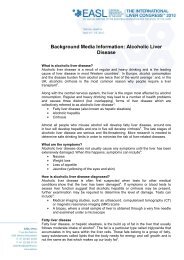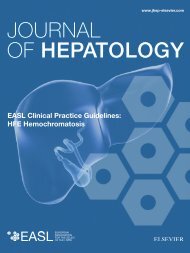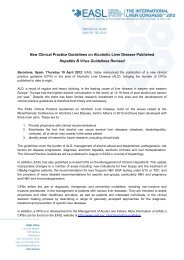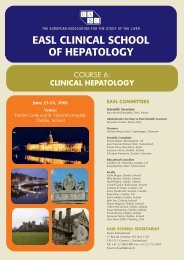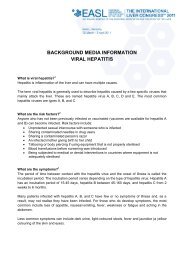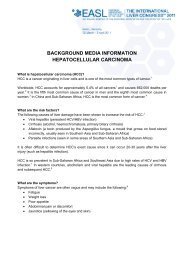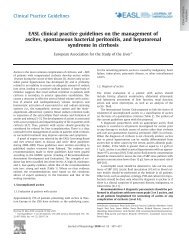barcelona . spain - European Association for the Study of the Liver
barcelona . spain - European Association for the Study of the Liver
barcelona . spain - European Association for the Study of the Liver
You also want an ePaper? Increase the reach of your titles
YUMPU automatically turns print PDFs into web optimized ePapers that Google loves.
BARCELONA . SPAIN<br />
116 POSTGRADUATE COURSE SYLLABUS ALCOHOLIC LIVER DISEASE 117<br />
APRIL 18 - 19/2012 THE INTERNATIONAL LIVER CONGRESS TM 2012<br />
CAN WE OFFER LIVER TRANSPLANTATION TO PATIENTS WITH<br />
ALCOHOLIC HEPATITIS<br />
ANSWER: NO<br />
James Neuberger<br />
Bristol, UK<br />
E-mail: j.m.neuberger@bham.ac.uk<br />
The arguments against <strong>the</strong> use <strong>of</strong> livers from deceased donors are summarised below. These arguments<br />
do not express <strong>the</strong> opinions <strong>of</strong> <strong>the</strong> author, <strong>the</strong> Queen Elizabeth Hospital or NHS Blood and Transplant.<br />
KEY POINTS<br />
• Access to liver transplantation should be based on <strong>the</strong> transparent criteria <strong>of</strong> need, benefit,<br />
justice and equity. Those with alcoholic hepatitis (AH) have <strong>the</strong> same right to be considered <strong>for</strong><br />
liver transplantation (LT) as all o<strong>the</strong>r patients on <strong>the</strong> same non-judgemental criteria and without<br />
a need <strong>for</strong> a fixed, arbitrary period <strong>of</strong> abstinence.<br />
• While <strong>the</strong> landmark study from Mathurin shows that transplantation can be done successfully<br />
<strong>for</strong> highly selected patients with AH, outcomes after transplantation are less good than <strong>for</strong> o<strong>the</strong>r<br />
indications and a significant proportion <strong>of</strong> those who met <strong>the</strong> criteria <strong>for</strong> transplantation will<br />
survive without surgery. These are spared <strong>the</strong> long-term consequences <strong>of</strong> immunosuppression<br />
and its associated risks <strong>of</strong> cancer, infection and kidney failure.<br />
• These observations suggest that transplantation <strong>for</strong> AH is not an efficient use <strong>of</strong> scarce<br />
resources and will deprive those patients who will have a better outcome.<br />
• Newer <strong>the</strong>rapies <strong>for</strong> AH may prove more effective and safer than LT.<br />
• Because <strong>the</strong>re is a shortage <strong>of</strong> donor livers, clinicians will need to identify those who would<br />
<strong>the</strong>re<strong>for</strong>e lose access to transplantation if <strong>the</strong> recipient pool is increased.<br />
• Public opinion is against <strong>the</strong> use <strong>of</strong> donated livers <strong>for</strong> those with alcohol-associated liver<br />
disease so widespread use <strong>of</strong> donated livers may result in a decrease in donations.<br />
INTRODUCTION<br />
The number <strong>of</strong> people who would benefit from liver transplantation is considerably greater than <strong>the</strong> number<br />
<strong>of</strong> available grafts donated after death. There<strong>for</strong>e this scarce resource needs to be rationed. While livers<br />
can be allocated using a number <strong>of</strong> different approaches (such as need, benefit or utility), it is also essential<br />
that donated livers are allocated according to a process that is objective, transparent and just. Although<br />
allocation models vary between jurisdictions, all models include elements <strong>of</strong> benefit and need.<br />
Allocation <strong>of</strong> donated livers to those with end-stage liver disease from self-induced habits has long attracted<br />
controversy but it is not <strong>the</strong> role <strong>of</strong> <strong>the</strong> clinician to make value judgements. Allocation <strong>of</strong> organs to those with<br />
self-induced liver damage (whe<strong>the</strong>r from alcohol, drug use or excessive eating) should be based on need<br />
and benefit, as <strong>for</strong> any o<strong>the</strong>r indication.<br />
In those with alcohol-associated liver disease, whe<strong>the</strong>r with cirrhosis or acute alcoholic hepatitis, allocation<br />
should be based on:<br />
• Need: will <strong>the</strong> patient die from liver failure in <strong>the</strong> absence <strong>of</strong> transplantation<br />
• Benefit: will <strong>the</strong> patient have sufficient benefit from <strong>the</strong> transplant<br />
• Outcome: will <strong>the</strong> patient comply with <strong>the</strong> need <strong>for</strong> follow-up and monitoring<br />
and avoid alcohol excess<br />
NEED AND BENEFIT<br />
Does <strong>the</strong> patient need a transplant<br />
In many ways <strong>the</strong> patient with AH should be considered in <strong>the</strong> same way as <strong>the</strong> patient with fulminant<br />
hepatic failure (FHF): if <strong>the</strong> patient survives <strong>the</strong> initial illness, <strong>the</strong>n survival is likely to be very good and<br />
similar to <strong>the</strong> normal healthy population, if abstinence is maintained (Sandahl (a)). This contrasts with <strong>the</strong><br />
patient with cirrhosis where <strong>the</strong>re is a progressive risk <strong>of</strong> decompensation, liver cell cancer and death.<br />
Life after transplantation, while usually very good, is not normal in ei<strong>the</strong>r quality or quantity. Those who<br />
survive <strong>the</strong> first year have an increased risk <strong>of</strong> death compared with <strong>the</strong> age matched population. For<br />
example, UK figures show that a male aged 45 years at transplantation who survives <strong>the</strong> first post operative<br />
year had a survival reduced by 17 years which represents a 15 year loss <strong>of</strong> life expectancy. There is an<br />
increased risk <strong>of</strong> malignancy (at least 2-fold compared with aged and sex matched population), a 2-3 fold<br />
increased risk <strong>of</strong> death from cerebrovascular and cardiovascular disease, as well as infection and renal<br />
failure. Indeed, in <strong>the</strong> long term, <strong>the</strong> risk <strong>of</strong> renal failure is likely to be even greater in those grafted <strong>for</strong> AH<br />
since renal impairment is common and pre-transplant renal impairment is good prognostic marker <strong>for</strong> late<br />
stage renal failure post LT. The quality <strong>of</strong> life is also reduced with only half returning to work or home-making.<br />
Is a period <strong>of</strong> abstinence necessary<br />
In many patients with alcoholic liver disease, abstinence is associated with improvement. Often a period<br />
<strong>of</strong> abstinence is required, not only to assess whe<strong>the</strong>r <strong>the</strong> patient will improve to such an extent that<br />
transplantation is not required but also to explore why <strong>the</strong> patient has drunk excessively and to put in<br />
place support so <strong>the</strong> patient will be helped to maintain abstinence. There is little place <strong>for</strong> a fixed period <strong>of</strong><br />
abstinence as <strong>the</strong>re are few data to justify any given period (Brown) and in those with severe disease, such<br />
as AH, death may be <strong>the</strong> price <strong>of</strong> proving abstinence. In <strong>the</strong> UK, <strong>the</strong>re is no requirement <strong>for</strong> a fixed period.<br />
Will <strong>the</strong> patient return to alcohol<br />
Despite much public concern, <strong>the</strong> evidence suggests that a return to a damaging pattern <strong>of</strong> alcohol<br />
consumption is low: indeed, our own data show that, at 5 years, graft loss from alcohol is similar to that from<br />
recurrent PBC (4%) and considerably less than <strong>for</strong> HCV infection (25%). None<strong>the</strong>less, a patient returning to<br />
alcohol does have a major adverse impact on public perception.<br />
Will <strong>the</strong> patient survive without a transplant<br />
While <strong>the</strong>re are several prognostic models that predict survival <strong>of</strong> those with AH, <strong>the</strong>se models are relatively<br />
imprecise when applied to <strong>the</strong> individual (Sandahl (b), Singal). Thus, <strong>the</strong>re is a real risk that transplantation<br />
will be done needlessly and ano<strong>the</strong>r recipient dies.<br />
Are <strong>the</strong>re o<strong>the</strong>r potentially less toxic treatments<br />
There is an increasing number <strong>of</strong> agents being assessed <strong>for</strong> those with AH: <strong>the</strong>se include corticosteroids,<br />
anti-TNF, N-acetyl cysteine, oxypentifylline as well as new potential targets such as CXC chemokines, and<br />
osteopontin (Gao, Altamirano). If effective, <strong>the</strong> patient is more likely to return to a better quality and quantity<br />
<strong>of</strong> life than with a transplant.<br />
BENEFIT<br />
There have been several case reports showing that liver transplant can be done successfully in alcoholic<br />
hepatitis (Singhal) but <strong>the</strong> landmark study by Mathurin and colleagues provides <strong>the</strong> first clear evidence that<br />
<strong>the</strong>re is a survival benefit. While this study shows clearly that transplantation can be <strong>of</strong>fered with survival<br />
benefit to a highly selected group <strong>of</strong> patients with AH, it does not mean that this scarce resource should be<br />
allocated to this group.<br />
Survival <strong>of</strong> <strong>the</strong> transplanted group is less than would be expected in those with cirrhosis or acute liver<br />
failure: current <strong>European</strong> and US data suggest that survival rates <strong>of</strong> over 90% should be anticipated at 1



